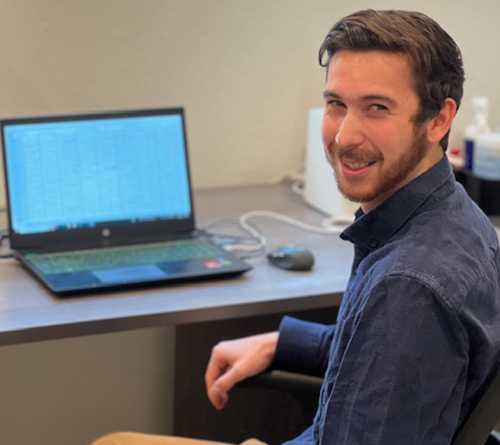Simeon Aragon
Neurofeedback TechnicianExecutive Function Skills Coach
 A little bit about me
A little bit about me
Moving from coffee to college, I transitioned from a job at Starbucks to a bachelor’s degree in psychology from Houston Baptist University (Now Houston Christian University). I have found a calling in the therapy world and am committed to making my career meaningful to myself and to those around me. I am advancing this vision by working on my master’s degree in Christian Counseling at HCU, and intentionally surrounding myself with mature mental health professionals. I am grateful to be in this field and hope to make a meaningful impact on those who seek a flourishing life. Other interests involve leading worship, enjoying fiction, learning through non-fiction, enjoying nature; and spending time with people I love like my wife, Miriam, Jesus, and my family.
Why Neurofeedback?
I have always had a love-hate relationship with neurology because I’ve found it fascinating, but I have only seen it in the context of research and laboratories. While a fascinating subject, it did not fit into my vision of helping people. Neurofeedback (NFB), however, is the perfect unification of those two worlds. NFB uses empirical data to target certain brain regions to aid in bringing the brain toward optimal functioning. Mark, my supervisor, has helped me to think about it as a workout for the brain. You come in to see a personal trainer (Mark), to use his personal gym (NFB equipment), lift weights (respond to rewards), a few sets with a few reps (4-6 segments of 5-minute training), get stronger (think better), and progress your regimen (adjust program when needed). I am a part of the team that helps you use the equipment and offers support for your brain training. I geek out at least once a week when I get to be hands-on with NFB training. I am passionate about helping people and think the brain is an intriguing and powerful part of us.
Executive Skills Coaching
We offer Executive Function Skills Coaching for those struggling to perform life tasks in areas like organization, planning, emotional control, task initiation, focused attention, and more. We help raise awareness of natural strengths and work together to improve goal-directed persistence.
Coaching consists of one to three weekly check-ins and discussions in which we strategize goal formulation, planning, problem-solving, emotional regulation, and task completion with worksheets, accountability, and teamwork to help in everyday functioning.
Coaching has personal relevance for me because of the experience of my own transition from at-home learning to in-person college and graduate-level learning; a significant change was needed. I deeply desire to help those who don’t “feel” like they have what it takes to succeed, for I have also experienced a fear of inadequacy.
I have had the privilege to learn from some of the most prominent figures in this field, Peg Dawson and Richard Guare, who have formulated their approach in books (Smart but Scattered) and courses.
Over the course of time, research has proven that coaching of this kind achieves significant success in reaching desired goals. Results, however, are largely determined by the efforts you invest. Coaching is a comprehensive process that may involve different areas of your life, including work, finances, health, relationships, education and recreation. The focus is the development and implementation of strategies to reach client-identified goals of enhanced performance and personal satisfaction.
Executive Functioning services are not considered psychotherapy or psychological services.

